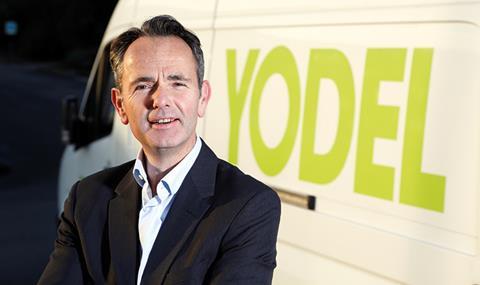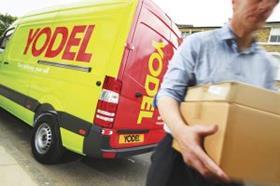
Just before he left the business in January, Yodel's then CEO Mike Cooper told MT about his four-point plan to turn Yodel around from years of losses to profitability. Redesigning its transport network and harnessing its data more effectively are some of the things achieved in his time at the business.
Yodel has been haemorrhaging cash for so long that its CEO Mike Cooper used the word to describe his company’s past results. In its eight years of life, Yodel has never managed to crawl into profit.
In its most recently reported financial year, to 30 June 2016, the carrier waved goodbye to £50.4m in its seventh consecutive pre-tax loss since the company was formed with the merger of Home Delivery Network with DHL Express’s domestic B2B and B2C operation in 2010.
But all that, according to Cooper, is about to change. With a new operations team, extensive IT investment and a four-point strategy to drive the bottom line, Cooper says this year will be a year of change for the better at Yodel.

Cooper became the latest in a series of CEOs appointed by Yodel’s billionaire owners the Barclay brothers in February 2016, and on his first day was faced with an episode of Channel 4’s Dispatches airing footage of the carrier’s employees throwing and walking over consumers’ parcels.
“It wasn’t the greatest introduction to the company,” Cooper tells MT, “but we went into that episode with huge trepidation and, OK it wasn’t hugely flattering, but if you look at the content they had to go back some way to find all the footage to pull it together.
“But it was a wake-up call for us – it was good for us to be able to say ‘this cannot happen again’. I told the teams to assume that there will be journalists around over peak, so what we do has to be up to scratch.”
Lost identity
Joining Yodel from EasyJet, Cooper was under no illusion that the business was in good shape numerically. But what did take him by surprise, he says, was that Yodel hadn’t just lost millions of pounds; it had lost its identity along the way.
“I did 72 one-on-one meetings when I arrived, and the recurring theme from people inside and outside the business was that they didn’t know what Yodel stood for. Our big clients would say we know what DPD stands for, we know its legacy, we know what it’s good at. We know what Hermes stands for, with its lower cost model. But then there’s Yodel sitting in the middle of it, with not much view of itself in terms of its identity and its market position.”
"I told the teams to assume that there will be journalists around over peak, so what we do has to be up to scratch.”
Cooper made it his and his leadership team’s mission to articulate how Yodel was going to succeed, and its direction of travel. The answer, they decided, was to differentiate itself to its clients by personalising the service it offers each retailer.
“I don’t believe there is anyone in the industry doing that credibly at the moment,” says Cooper. “Every day we get feedback from 6,000 consumers around the UK. That’s gold dust to our clients. We can personalise the data they receive to different parts of the country, for example. We present it on a dashboard for them and we can say ‘this is what your clients are saying through us’.
Silent branding
Instead of sticking its branding all over its clients’ website and apps, Yodel plans to integrate itself silently into the background for those retailers that opt for its Xperience service.
“Retailers want to build a brand that brings people back to shop with them, and says we’ll deliver your order too. So rather than sending the consumer to a different website or app, we’ll embed our functionality onto the retailers’ website. So the Yodel brand becomes silent, almost invisible.”
Creating this point of difference is a strong selling point because consumers shopping with different clients have different expectations from the delivery service they receive.

“Talk to marketing director of John Lewis about the relationship it is trying to build with its customers and you get a different response from talking to the logistics carrier manager from Missguided. So while consumers may say it’s delivering a parcel, for our clients’ businesses it’s a very type of experience that they’re trying to create.”
Bespoke client experience is just the first of four strands to Yodel’s strategy to improve its bottom line, which Cooper believes will cross into profit in the next 12 months.
The second goal is to create a more flexible transport network, which included adding Sunday deliveries to its portfolio and changing final-mile drivers’ long-standing terms and conditions.
“To get a more efficient cost base we spent six months [of 2017] negotiating with three trade unions," he says. "It’s a seven-day market and we’re asking people to step up to that. So there are some tensions.”
Yodel eventually won the seven-day flexibility it needed, but only after tough negotiation with the unions and three ballots.
“We had to sweeten it. And I think you look at yourself in the mirror in the morning and know that is the fair and the right thing to do," says Cooper. "In any business you’re running these trade offs between a shareholder who’s haemorrhaging cash on the one hand and guys who’ve had T&Cs and ways of working for a long time."
Innovation
The third strand of Yodel’s strategy is to create a more stable and innovative platform for its data, and to use it in a more effective way.
The carrier has spent more than £20m on IT upgrades in the past two years, replacing an inefficient technology infrastructure that was a hangover from Yodel’s integration with DHL Domestic in 2010.
“DHL Domestic and Yodel both had their own systems, and both stemmed from the 1970s and 1980s. And we bound those two ageing, creaking systems with a bit of a string, and that was Yodel’s IT system until now.”
In its 2016 peak, Yodel processed some data that would have taken more than 24 hours using its old IT system. With the upgraded version, it took just 20 seconds.
“We’ve made great progress in that area,” Cooper says, “but there’s still a lot more to do.”
The fourth and final strand to Yodel’s game plan is to ensure its people are engaged with the business and doing their best work.
“We have about 10,000 people, and peak is about 13,000. If those people aren’t engaged – if they don’t understand the direction of travel, feel committed and understand their particular role – then you’re knackered.”
“DHL Domestic and Yodel both had their own systems, and both stemmed from the 1970s and 1980s. And we bound those two ageing, creaking systems with a bit of a string, and that was Yodel’s IT system until now.”
To this end, Cooper replaced much of his operations leadership team after joining the business, restructuring it and strengthening it with three retail specialists led by former Marks and Spencer logistics director Adrian Harris. He says their role, ensuring parcels get from A to B, underpins Yodel’s future.
“You can come out with all the fancy strategies in the world, but unless you’ve got that underpin of boringly consistent delivery, forget whizzy new tech, your clients don’t want to talk to you about that. They want to know why it went wrong last week.”
While Cooper concedes that DPD has set a tough benchmark for delivery standards in the parcel sector, he believes that other carriers will catch up in that area, while Yodel blazes a trail in its client-focused strategy.

“In terms of the end consumer there’s some hygiene stuff where you have to be at a certain level or you’re just not credible in tomorrow’s market. But that’s not a point of difference. We will be good enough at that, and be better at creating a different experience for retailers.”
Another hurdle Yodel is working to overcome is its public reputation, which has taken a beating in the past. But Cooper says its reach of three million households a week puts the business in good stead to do this.
“The Yodel brand was toxic, but we’ve got three million people a week consistently saying we’ve provided a good service. If we were touching 50,000 houses a week our ability to change how people view the brand would be very limited,” he says.
Transformation
Cooper believes that its troubled background actually gives Yodel an advantage when it comes to business transformation.
“The more successful the organisation, the more difficult it is to change. The one good thing we have here is we know we haven’t been as successful as we could have been, so we can build on that and turn it into something different and positive.”
But how many years will the Barclays continue to put money into Yodel’s pockets? Yodel’s shareholders, Cooper understands, are in it for the “medium term”.
“They’re very proud of the businesses they’ve built elsewhere and they want to be similarly proud of the businesses they’ve built here.”
Cooper says he and his team have given shareholders a credible growth strategy that they are delivering against and that progress has been good.
“We’re not locked into a market where you can make very little change, and that’s one of the reasons I joined it,” he says. “In 18 to 24 months, Yodel will be dramatically different.”














